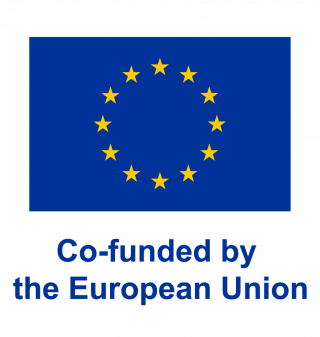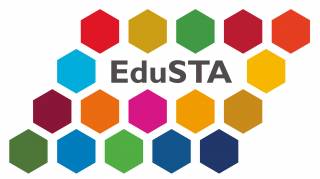Since this exchange was not foreseen in the original EduSTA grant agreement, the Hanze Team was fortunate to be able to apply for a grant under the conditions of an Erasmus+ mobility agreement for staff mobility for teaching/training.
The training aimed to explore some of the key concepts of Futures Literacy and the underpinning discipline of anticipation and to put these into practice by communally designing and trying out Futures Thinking micro-interventions for the workplace. So what happened when Hanze and UdG met?
After some communal, final preparations on Monday 10th, the actual training kicked off on Tuesday 11th with a learning by doing experience in the form of a Futures Literacy Lab on the Future of Learning. The Girona team came well prepared by forming and inviting a multi perspective participants group of 36, coming from different parts of the university and its stakeholders and holding a shared interest to explore the topic.
In a rigorously structured program, consisting of several powerful futures thinking tools (f.e. Polak game, Causal Layered Analysis, Dynamic Reframe and Wonder Walk), the participants were challenged to reveal their anticipatory assumptions on the future of Learning and to reframe and rethink them in order to make better informed decisions in the present. With this experience as a base, the 11 faculty members that wished to develop their Futures Thinking Catalysing skills, joined forces in the subsequent two and half days to design and refine their own contextualised Futures Thinking micro-interventions.
Besides revisiting Tuesdays lab and it’s underlaying process and design principles, Wednesday was dedicated to further explore the topic of the future of Universities – a theme currently close to heart of the university of Girona. This paved the way for the team to start designing their own Futures Thinking micro-interventions, making use of a template that contextualized the demonstration of the competence objectives and assessment criteria to obtain a Futures Thinking Catalyzer badge: This badge is one out of the constellation of different badges under umbrella of the meta-badge Educator for Sustainable Future, developed and implemented within the EduSTA project.
Three intervention prototypes, immediately applicable in the participants’ context, were tried out and redesigned on Thursday afternoon and Friday morning, leading to a successful competence demonstration for all participants.
Apart from the enthusiasm and motivation of the participants and the trainers, and the synergy created amongst them, several working principles can be derived out of the evaluation of the module, according to the evaluation by the participants and trainers:
- the 3,5 day pressure cooker we placed ourselves in;
- the clear and structured program;
- the collaboration with colleagues on applying the newly gain insights in real life situations in the near future and, last not but least;
- the Futures Literacy Lab as a leverage for futures thinking and anticipatory competence and the aspiration to catalyse this with colleagues and students.
Text:
Jaume Ametller Lleal & Elles Kazemier
Project leaders from UdG & Hanze
Photo’s by Girona and Hanze consortium members
Main photo, from left to right: Corine, Raquel, Jaume, Dolors, Jesus, Ingrid, Rudi, Julie, Fatou, Elles, Lauren, Silvia and Marta (Luisa not in picture)




